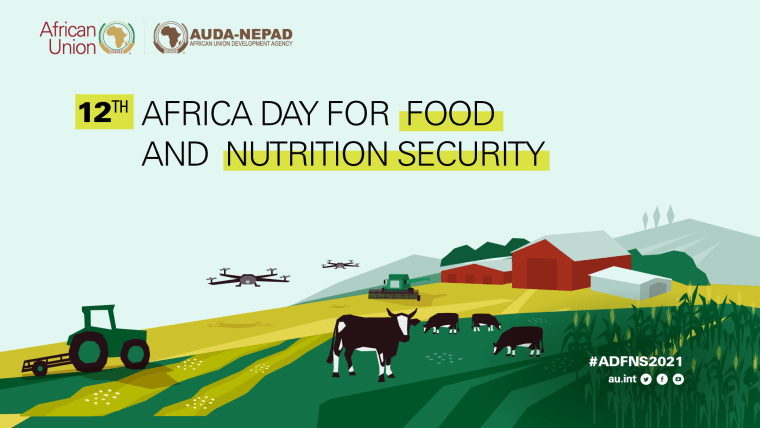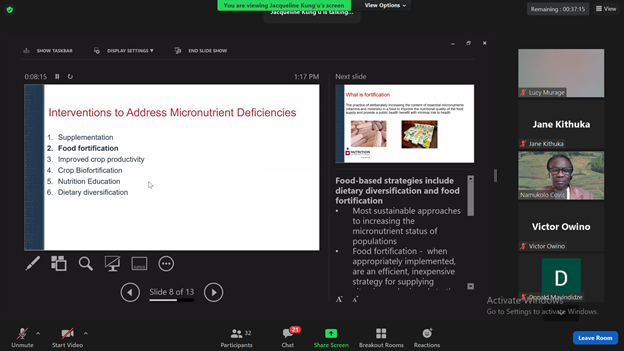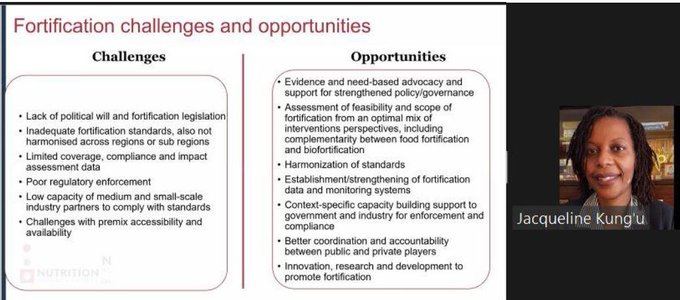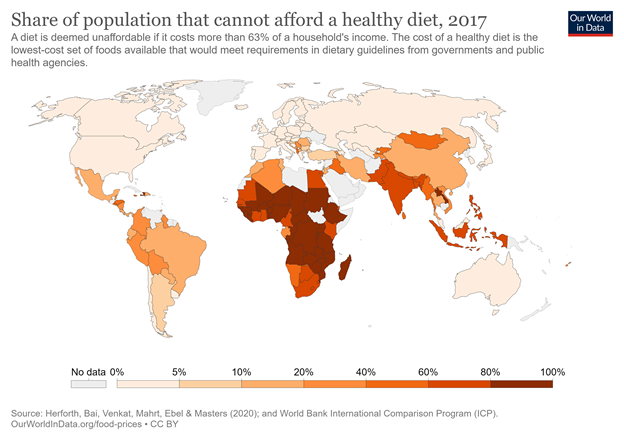African Diets for Sustained Food Systems and Nutrition”
RECORDING FORTHCOMING
The objective of this year’s edition of African Day for food and nutrition was to “increase awareness on African foods, bring them into the agribusiness domain, and motivate wide acceptability of diets. It aimed at building a compelling case for integrating African foods (both from plants and animals) into different food systems.” Discussions were held along four main sub-themes:This event was organized by the African Union Commission (AUC), Department of Agriculture Rural Development, Sustainable Environment and Blue Economy (DARBE).
The Africa Day For Food And Nutrition Security has so far been successfully commemorated 11 times following its launch in Lilongwe, Malawi, on 31st October 2010. Ten successive editions of the Day were hosted by Ethiopia, AU Headquarters, Niger, Democratic Republic of Congo, Uganda, Ghana, Côte d’Ivoire, Tanzania and Egypt. Due to COVID-19, the 2020 edition of the ADFNS was commemorated virtually under the theme “Resilient Food Systems toward Healthy Diets for the Vulnerable during Emergencies: Lessons from the Covid-19 Pandemic”.- Strategic directions for promoting increased production and processing of nutrient-rich African food crops. Local food suffers from low demand, shortage of quality seeds, and limited technologies to increase productivity. Many of these foods are consumed without significant processing due to lack of processing technologies, and vast quantities are harvested from nature. With no clear market structure, there is a low uptake of indigenous traditional knowledge. To reverse these trends, it was recommended “to increase public education, and investments in indigenous foods and mainstream indigenous foods in national, regional and continental policies and action plans”.
- Scaling up innovative technologies for intensive processing and diversification of African diets. More than 200 varieties of bio fortified crops are being tested in different African countries, including African traditional staples, such as cassava, millet, beans, and sweet potatoes. Currently more than 32 million people are benefiting from bio fortified crops. Industrial fortification works at large scale through companies and has the potential to reduce anaemia goitre and decrease the odds of neural tube defects. Participants also underlined the need for product development of indigenous foods and promotion of innovations to improve demand and develop markets.
- Enhanced market availability and reach of nutrient-dense African foods. Accessibility of nutritious foods, including African indigenous foods, at the market level is key. In line with the Malabo Declaration and the Africa Regional Nutrition Strategy, investment in research of indigenous foods need to be scaled up to enhance its availability and accessibility. This includes preparation, packaging, and branding to promote commercialization. Such actions also improve the profitability of small-scale farmers and enterprises and the recognition at national, regional, and global levels.
- Creating enabling policy environment for leveraging private sector investment in local diets for transformed African food systems through multi-sectoral approach in policy development and implementation.
28/10: Technical sessions
Sub-theme 1: Strategic directions for promoting increased production and
processing of nutrient-rich African food crops
- Moderator: Prof Linley Chiwona-Karltun
- Mphumuzi Sukati, FAO RAF : Strategic options for increased production and processing of nutrient-rich African traditional food
- Dr Salome Kasimba, Indigenous Food Researcher: Availability of African traditional food
- Ms Maureen Muketha, Indigenous Foods Champion: Affordability of African traditional food
- Ms Anna Mukiibi Bunnya, Deputy Country Director, WFP, Ghana Desirability & value addition of African traditional food
- Mr Divine Ntiokam, Youth representative and founder of Smart Agriculture Youth Network and Food Systems Champion The role of Youth and women and African traditional food
Sub-theme 2: Scaling up innovative technologies for intensive processing and diversification of African diets
- Moderator: Dr. Namukolo Covic, A4NH/IFPRI
- Opening Remarks Ms. Fati N’zi-Hassane, AUDA-NEPAD
- Donald Mavindidze, HarvestPlus Biofortification: what has been done? What are the adoption challenges and how can they be best addressed; what are the current plans from the Harvest Plus/AUDA-NEPAD partnership?
- ICRISAT Conservation and improved utilization of indigenous animal genetics. The challenges and opportunities and what is being done to advance this domain
- Victor Owino, IAEA Isotope technologies that have been used successfully in Africa in assessing the nutritional value of traditional foods: What are the adoption challenges and how can we do better?
- FTRC (Botswana) Using technology to promote production and consumption of traditional and indigenous foods
- Moderator: Dr. J. Chris Toe, WFP Senior Advisor for Corporate and Country Engagement
- Ms. Fati N’zi-Hassane, Supervisor, Human Capital and Institutions Division, AUDA-NEPAD Keynote Presentation & Setting the Scene
- Mr Fatunbi Oluwole, FARA, Lead Specialist: Innovation Systems and Partnerships Accessibility of nutritious foods, including African indigenous foods at the market level
- Saskia Depee, Programme WFP, Analytics & Science for Food & Nutrition Affordability of nutritious foods, including African indigenous foods at the market level
- Ms Mildred Jantjies, Pan-African Women’s Organisation for Southern African Regional Office (PAWO-SARO), Executive Secretary Women economic and financial inclusion in nutritious foods value chains at the market level
- Mrs Kgaladi Thema Sethoga |Founder of House of Indiza Indigenous teas, grains and legumes of South Africa Preparation and Consumption of African Indigenous Foods: Challenges and Opportunities
Sub-theme 4 Creating enabling policy environment for leveraging private sector investment in local diets for transformed African food systems
- Moderator: Ms. Bibi Giyose Senior Food and Nutrition Officer and Advisor, FAO/AUDA-NEPAD
- Immaculate A. Nyaugo, AfECN Nutrition Manager –MOH Nutrition and dietetics Unit. Coordinator Kenya National Food Consumption Survey. Creating enabling policy environment for leveraging private sector investment in local diets for transformed African food systems by Making local African diets work for young children.
- Maggie Kamau-Biruri, Board Member Africa Early Childhood Network and Head of partnerships, Harvest Plus The extent to which political dialogue and advocacy have raised the level of political commitment on nutrition among member states;
- Dr. Béatrice Ekesa, Senior Scientist-Nutrition & Country Representative (Uganda), Alliance of Diversity International and CIAT National Nutrition Plans and legal frameworks, regulatory and voluntary instruments that advance the cause for nutrition and particularly local diets
- Dr. Hlamalani Ngwenya, Chief Director: Agricultural Producer Support and Development, Department of Agriculture Western Cape Government Lessons learned from inter-sector and multi-stakeholder mechanisms/platforms for food security and nutrition
- Dr. Tshilidzi Madzivhandila, CEO and Head of Mission Food, Agriculture and Natural Resources Policy Analysis Network (FANRPAN) Appropriate technologies and infrastructure (storage, preservation, transport and distribution) to promote local diets and curb waste
29/10 Main Session
- Moderator: Dr. Namukolo Covic, Senior Research Coordinator, A4NH/IFPRI; President of African Nutrition Society (ANS)
- Dr. Chimimba David Phiri, Subregional Coordinator for Eastern Africa (SFE) and FAO Representative to the African Union (AU)
- H.E. Dr. Ibrahim Assane Mayaki, CEO of AUDA-NEPAD
"We need better consumer education to enable the youth to demand a healthier diet and to give a push to nudge the private sector to start having nutrition as the main objective in a better approach from farm to plate." - Godfrey Bahigwa, Director of Rural Economy and Agriculture of the African Union in behalf of H.E. Amb. Josefa Leonel Correia Sacko, AU Commissioner for Agriculture, Rural Development, Blue Economy & Sustainable Environment
- Mr. Stanlake Samkange, Chair of CAADP - Development Partners Coordination Group (DPCG) Senior Director for Strategic Partnerships at WFP
- Summary of the 4 sessions by Liz Ogutu - Policy and Advocacy Officer for Africa · HarvestPlus
- Professor Shaukat Abdulrazak, Director, Division for Africa | Department of Technical Cooperation, IAEA
- Nutrition International
- Amos Laar, University of Ghana and Africa Nutrition Society (Former President): “The role of food environments in fostering a food systems transformation that integrates Africa’s traditional and indigenous foods”.
- Professor Anna Lartey, University of Ghana (Former FAO
Bringing everything together and moving forward to impacts:
- AUDA-NEPAD (presenter tbc): UNFSS Africa Common Position on traditional and indigenous food and school feeding as entry points
- Dr. Sisay Sinamo, Senior Programme Manager, Seqota Declaration Federal Programme Delivery Unit (Ethiopia): Demonstrating that in aligned multisector actions through The Seqota Declaration, agriculture can make significant impacts on stunting: The Ethiopia example
- Ms. Gerda Verburg Coordinator, SUN Movement: Integrating country efforts to reach scale







No comments:
Post a Comment